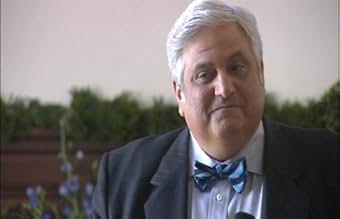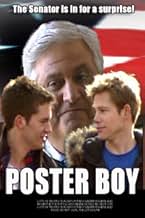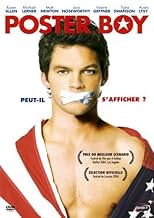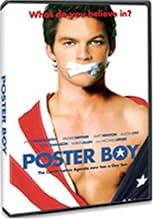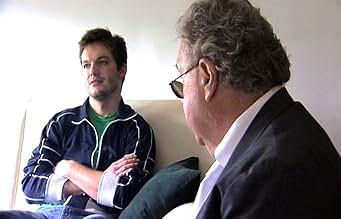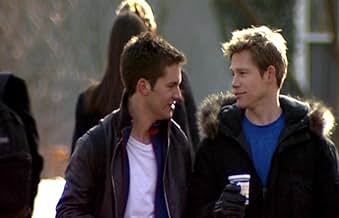With the help of a hot, slightly older new acquaintence (Noseworthy), the closeted son (Newton) of a conservative U.S. Senator (Lerner) puts a shocking spin on his dad's re-election campaign... Read allWith the help of a hot, slightly older new acquaintence (Noseworthy), the closeted son (Newton) of a conservative U.S. Senator (Lerner) puts a shocking spin on his dad's re-election campaign.With the help of a hot, slightly older new acquaintence (Noseworthy), the closeted son (Newton) of a conservative U.S. Senator (Lerner) puts a shocking spin on his dad's re-election campaign.
- Director
- Writers
- Stars
- Awards
- 1 win & 2 nominations total
- Skip Franklin
- (as Ian Kessler)
- Director
- Writers
- All cast & crew
- Production, box office & more at IMDbPro
Featured reviews
The story is told in the form of a rather obnoxious reporter interviewing Henry, the senator's son. As he describes the events leading up to his outing, we fade in & out of the scenes. This format has been used successfully several times in the past. It doesn't work this time. By the end of the film I felt as thought I'd watched a bad documentary, just witnessing the events, feeling nothing for the people involved. The other problem is the main characters seem almost schizophrenic in their personalities. One moment Henry is throwing the suit & tie clad Young Republican into the pool; the next moment he's bonding with him and hiring him a hooker when he learns he's still a virgin. We first meet Anthony as an "out there" Act Up! activist; we next see him a sensitive best friend of an AIDS-stricken woman. Next he's telling her that he also had sex with her boyfriend that gave her AIDS; we next see him caring about Henry, whom he had vowed to "out".
By the time Henry is outed, I was looking at my watch and waiting for the ending credits. Too bad. Good plot done wrong in about every detail. Better luck next time.
Some other users have commented on the movie not being multi dimensional, but I think that the way that the characters reacted are pretty realistic, and most people (generally) are multi dimensional but may only show one side of their selves for one reason or another, and don't forget that this movie is focused from the point of view of Henry Kray. It also has many plot twists, and though it has be commented upon that it is too predictable, I thought nothing of the sort. The characters are oddly unpredictable, and are like multi layered onions, many people might just look it and observe that is it just another gay movie, but it is not, it is so much more than that.
Heavy-handed though it is, the script actually has a few good points to make. If only screenwriters Ryan Shiraki and Lecia Rosenthal put as much thought into telling a story as making a statement, especially when they're preaching to the choir. As it is, the narrative is more like a series of contrivances meant to move the characters toward that Big Moment rather than plausible events arising from believable circumstances. Luckily, the movie is buoyed somewhat by fairly solid acting. Karen Allen is a welcome presence as the senator's chain-smoking, heavy drinking wife, even if her Southern accent is a tad bit overdone (conversely, Lerner's Southern accent is almost nonexistent). Director and co-editor Zak Tucker packs the movie with lots of style—from quick cuts to split screens to moody gels and filters—making his movie nearly unwatchable in the process.
"Poster Boy" also has continuity errors galore. Cigarettes are a particular problem, be it a reporter lighting a half-smoked cigarette in the opening scene, only to be shown seconds later with a fresh one dangling from his lips unlit; or Allen smoking a newly lit cigarette, then shown lighting it a quick cut later. There's also the extra so nice we have to see her passing Newton and Noseworthy twice in the same scene (made worse by the fact that Newton calls attention to her the first time around), and Lerner is shown getting into a limo with his hair a mousy brown when in the rest of the movie it's white. Other distractions: How do Noseworthy and Geffner—one unemployed, the other a bookstore clerk making $7 an hour—afford a chauffeured Town Car? And why the gratuitous female nudity in a movie that features gay men with hyperactive sex lives? Sadly, the two male leads are only fleetingly shown in their skivvies.
For all its problems, "Poster Boy" isn't awful, but it made its statements so loudly and so often that I found myself tuning them out, wondering instead whether anyone in wardrobe was going to rustle up something else for Ms. Allen to wear besides that lavender suit.
The best aspect of the film is the acting. The core cast are all fantastic. What didn't work so well for me was the cinematography, editing and the general low budget approach. The cinematography is mostly (or maybe all) hand-held, with a lot of shaky cam shots and a lot of blurriness. The film is loaded with overexposed shots and a dominance of white. While that may have been so for metaphorical reasons, it's not the most pleasant thing to watch aesthetically if it's relentless--and that's also not the best way to get the metaphorical aspects across. The editing is frequently frenetic. In combination with the locations, sets and general lack of music, Poster Boy has the feel of a 100-thousand dollar art house drama made by a director who is way too obsessed with The Blair Witch Project.
Fortunately, the story is better than that would suggest, although it's not perfect. This would have been far more on-target and controversial 15 years ago (given our present knowledge and overall lack of reaction to the sexuality of some political offspring), but it's still engaging enough, especially given the performances, and at any rate, it deals with important issues that are still far from resolved in our culture.
Enter Anthony, a 28 but younger looking gay man, who's been a member of Act Up but who is now more interested in spending his time with affluent gal pal Izzie and perhaps getting into the pants of some college boy when they crash a campus party.
Despite being 28 Anthony can easily pass for a college guy and quickly meets several guys willing to show him a good time including Henry. Unaware of Henry's name Anthony hooks up with him and spends a fun evening on the floor of the school's darkened gymnasium. Only in the morning, after Henry has left him alone on the floor, does Anthony find out Henry's full identity.
Looking for any chance to take a shot at the conservative government that he detests Anthony decides to take this opportunity for political action. Only problem is that he finds himself beginning to care very deeply for Henry and he must decide if he can use someone he cares for in this way.
Did you know
- GoofsWhen Henry and Anthony are walking through the campus, Henry points out one of the girls walking ahead of them. Seconds later, you can clearly see her as an extra in the background.
- Quotes
Henry Kray: [to Jack] What am I part of, Jack? An issue? Don't you get it? Issues are what they use to divide us. Sexual orientation, race, gender... All issues that don't actually pertain to anyone except those being cut out and thrown away by the issue. Does it really matter to some farmer in Kansas whether or not two men get married in Vermont? But see, they need us to choose sides. They create these issues for us to cling to, to grasp at. You know they separate us into these divisions: Black, White, Gay, Straight, Rich, Poor. Blame it Christian, Liberal, Democrat, Conservative. Split. Different. Opposed. How can a cause be just if it puts people against each other?
- ConnectionsReferences The Wizard of Oz (1939)
- How long is Poster Boy?Powered by Alexa
Details
Box office
- Gross US & Canada
- $62,062
- Opening weekend US & Canada
- $3,806
- Aug 13, 2006
- Gross worldwide
- $62,062


